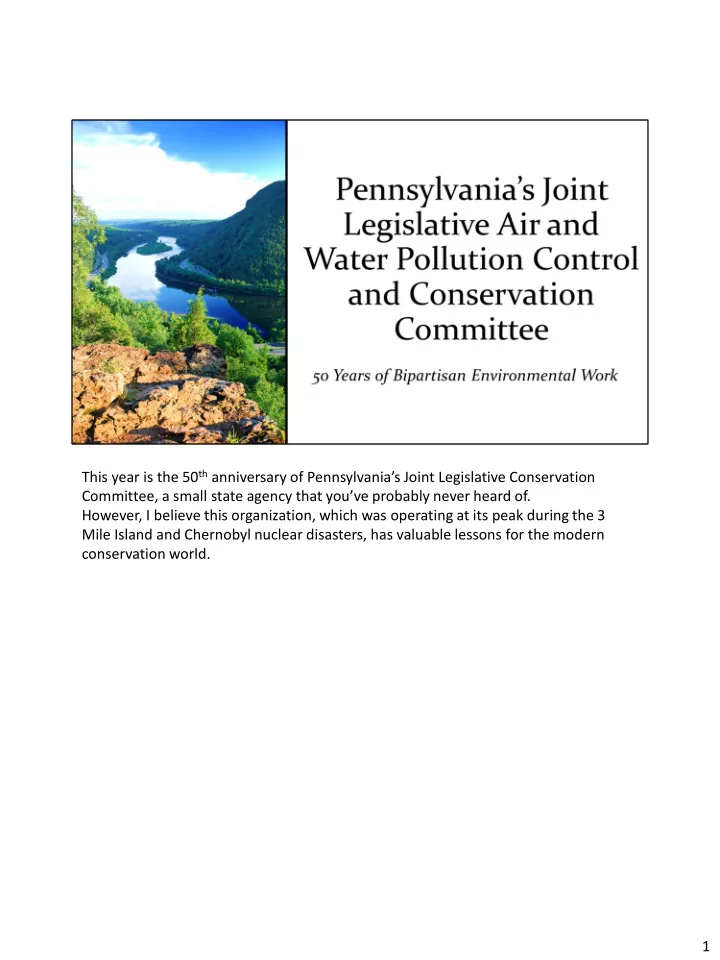

This year is the 50 th anniversary of Pennsylvania’s Joint Legislative Conservation Committee, a small state agency that you’ve probably never heard of. However, I believe this organization, which was operating at its peak during the 3 Mile Island and Chernobyl nuclear disasters, has valuable lessons for the modern conservation world. 1
The Committee, which I am now serving as a legislative member on, is bipartisan, serving both the democrat and republican members of the Pennsylvania legislature. In today’s especially contentious political climate, it might surprise you how much we’ve been able to accomplish. This is a photo of Pete Duncan, one of the founding members of the Committee, demonstrating the level of pollution in the rivers near Pittsburgh. During the 60s and 70s, the committee was instrumental in remediating the dangerously polluted environment. 2
Here are a few examples of the committee’s accomplishments. I’ll be focusing on just two today, the Waste Tires Recycling Act and the Environmental Rights Amendment to the Pennsylvania Constitution. 3
The Waste Tires Recycling Act of 1996 is a particularly illustrative example of the unique position of the Joint Conservation Committee. This act was drafted by the committee to address the millions of illegally dumped tires which were littered across streams and forests. Famously, a massive pile near Philadelphia caught fire, releasing toxic air pollutants. The Act passed both chambers unanimously and highlighted the ideal balance between environmental and economic responsibility. While not every issue the Committee works with ends this way, this is the ideal we strive for. 4
Perhaps the most notable achievement of the Committee is the ratification of the Environmental Rights Amendment in 1971. 5
Article 1, Section 27 of Pennsylvania’s State Constitution entrusts the protection and maintenance of the environment to the commonwealth, for both current citizens and for future generations. Just eight years after the ratification of this amendment, Pennsylvania bore witness to the nuclear accident and near disaster at 3 Mile Island. Following the lackluster response by the facility’s owners and the government, the same momentum that pushed for greater environmental stewardship returned. Seven years later, in Chernobyl, the international community saw the similar distrust and backlash after the horrific incident there. Both incidents have spawned anti- nuclear and environmental movements that have persisted into modern times. In places with strong democratic institutions and citizen rights, environmental protections can help establish accountability as well as consequences. Recently, Pennsylvania has begun citing its own amendment. 6
Incredibly, the first major use of the amendment was almost 50 years after its inception. Robinson vs. Commonwealth challenged Act 13 of 2012, which delegated most power over drilling to the state government rather than the local municipalities. The Pennsylvania Supreme court ruled in favor of the townships, as their residents would experience more environmental degradation and health threats than other regions of the commonwealth. The decision gave municipalities the ability to use zoning to protect their citizen’s health and their natural resources. 7
In 2008, the amendment was cited once more, again concerning natural gas drilling. The boom of Marcellus Shale coincided with one of the worst recessions in modern history. Pennsylvania’s state government was tempted to use revenue gained from leasing public forest land to drillers to balance the budget. Previously, these funds were used only by the state agency which manages these lands for the public. The act was challenged and ruled unconstitutional, once again citing the Environmental Rights Amendment. The court ruled that funds gathered from natural gas drilling must be used to mitigate the impacts of such operations. 8
As of today, the amendment has not been used in a broader context, but we shall see how these developments evolve in the years to come. Regardless of how the courts rule, I believe that environmental rights are vital to our citizen’s wellbeing. L aws and regulation can be amended or repealed, which is why a constitutional guarantee for access to healthy natural resources is vital for both the environment and the humans that depend upon it. 9
Recommend
More recommend